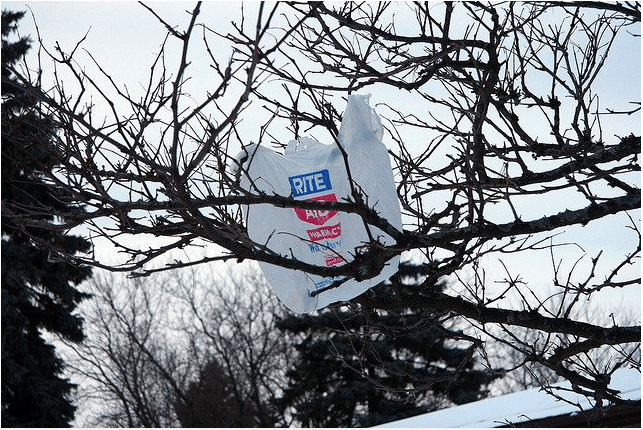Supporters Of Plastic Bag Fee Fighting Back Against Effort To Reverse It


Environmental advocates are fighting back against a Brooklyn State Senator’s efforts to reverse a controversial fee aimed at curbing the use of disposable grocery bags in favor of more environmentally-friendly, reusable alternatives.
State Senator Simcha Felder, who represents communities in South Brooklyn, has introduced legislation which would reverse an about to go into effect 5-cent fee on plastic and paper bags provided by New York City retailers. Felder’s bill prohibits the “imposition of any tax, fee or local charge on carry out merchandise bags in cities having a population of one million or more.”
Felder’s bill has not yet moved to the senate floor for a vote, but environmental groups fear it could happen shortly. There is a similar bill in the State Assembly, sponsored by Assemblymember Michael Cusick of Staten Island.
To become law, the bills would have to be passed by both houses of the legislature, and then signed by the Governor.
Proponents of the plastic bag fee, which passed the City Council 28-20 last May, say it will rein in the ubiquitous use of shopping bags — that pile up every year in landfills — and bring New York in line with cities like San Francisco and Washington D.C., which have passed similar legislation. Spearheaded by Council Member Brad Lander, the new five-cent fee on paper and plastic shopping bags is supposed to go into effect on February 15th.
Strictly speaking, the 5-cent fee is not a tax. The money is kept by retailers, and does not go back to the City. After the fee was passed, Senator Felder told The New York Times that it was “nothing less than a tax on the poor and the middle class — the most disadvantaged people.”
New Yorkers purchasing groceries with food stamps or via the WIC program are actually exempt from the fee, as are soup kitchens. The 5-cent charge does not apply to bags obtained from pharmacies, produce and liquor stores.
“Anti-Environment Power Grab”
Council Member Lander described Senator Felder’s bill as a “small-minded, pro-waste, plastic-industry-funded, undemocratic, anti-environment power-grab.”
“With Trump and the GOP Congress rolling back climate protections and bullying cities, it would be shameful for Albany to join them. Don’t they have more important work to do?” Lander asked in a recent statement.
“New York State legislators who care about the environment must defend the right of localities to advance effective, forward-looking environmental policy,” Lander continued.
The fierce debate over the bill exposes broader disagreement regarding how New York City should reduce its production of solid waste. The de Blasio administration has set the highly ambitious goal of sending zero solid waste to landfills by 2030 — only 13 years away.
Every day, roughly 21,000 tons of residential and commercial trash is moved by truck, barge and rail out of New York City. While only a fraction of our overall waste output, plastic bags have become symbolic of the city’s larger struggle with trash.
New Yorkers use 5.2 billion carryout bags per year, the majority of which are not recycled, says Bag It NYC, a coalition of community-based organizations which has supported the fee. The City pays an estimated $10 million to transport 100,000 tons of plastic bags to out-of-state landfills every year, they say.
Unfairly Impacting Low-Income New Yorkers?
Southern Brooklyn lawmakers have led the way in arguing that the plastic bag fee would disproportionately impact low-income and elderly New Yorkers.
In the State Assembly, the effort to reverse the bag fee is supported by Steven Cymbrowitz, Dov Hikind, Peter J. Abbate, William Colton, Jaime Williams, Nicole Malliotakis and Pamela Harris of Southern Brooklyn, along with Walter Mosley of Fort Greene, Erik Dilan of North Brooklyn, Maritza Davila of Bushwick and Charles Barron of East New York.
Council Members Mathieu Eugene (Flatbush) and David Greenfield (Midwood) voted against the bag fee last year. Jumaane Williams (Flatbush) came out in support of the fee — after supporting legislation was amended to require that a study be conducted of its impact on low-income New Yorkers.
Council Member Chaim Deutsch, who represents sections of Midwood, Brighton Beach and Sheepshead Bay, said he supports measures to protect the environment, but that the law should be written to encourage shoppers to use reusable bags, not punish those who don’t.
Similarly, Council Member Mark Treyger of Coney Island acknowledged that some higher-end grocery stores, such as Whole Foods, reward customers who use reusable bags, but he maintained that “for residents of Southern Brooklyn, this is not an equitable solution.”
Council Member Lander’s office notes that fees like the one passed by the City Council “have been proven to reduce the consumption of plastic bags by 60% – 90%. Across age, race, religion, and neighborhood…”
Officials from Washington, DC, which has a large low-income population, testified at a New York City Council hearing in 2014 that their five cent bag fee has been successful across all of Washington’s income groups.
The District’s Department of Environment (DDOE) commissioned a survey in 2013 which found that 83 percent of residents and 90 percent of businesses said they either supported the bag fee or had no strong feelings about it. Eight out of ten residents said they had reduced their use of disposable bags because of the fee.
What do you think about the plastic bag fee? How do you feel about the State Senate and Assembly’s efforts to reverse it?




